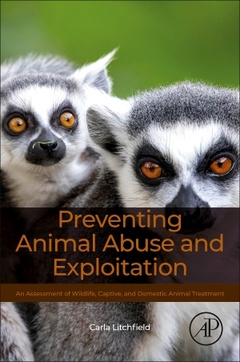Preventing Animal Abuse and Exploitation An Assessment of Wildlife, Captive, and Domestic Animal Treatment
Auteur : Litchfield Carla

Dr. Carla Litchfield is Associate Professor and Director of the Conservation Psychology and Applied Animal Behavior Research Group at the University of South Australia. She obtained her PhD from the University of Adelaide, and her research examines the psychological wellbeing, physical wellbeing, and conservation of captive and wild animals. She applies principles of human psychology to conservation issues such as illegal wildlife trade. Her focal species include sharks, primates, marine mammals, canids, felids, and birds. Dr. Litchfield has published numerous journal articles on conservation, animal welfare, and animal exploitation. She has authored several books, including the forthcoming Elsevier book Preventing Animal Abuse and Exploitation.
- Presents both scientific evidence and anecdotal evidence from a range of sources to provide a comprehensive account of global interactions between humans and other animals, and the use of animals for human purposes and consumption
- Considers the positives and negatives of every topic, helping readers decide where they stand on issues
- Includes suggestions on how people can make responsible choices and changes in their lives
- Provides a psychological perspective on animal exploitation and abuse and how to foster healthy, positive and meaningful interactions between humans, animals and the environment
Date de parution : 02-2025
Ouvrage de 186 p.
15x22.8 cm



